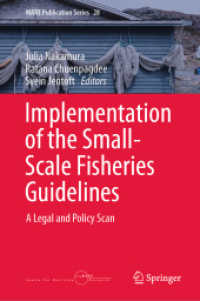- ホーム
- > 洋書
- > 英文書
- > Politics / International Relations
Full Description
For Ukraine, the signing of the Association Agreement and the DCFTA with the European Union in 2014 was an act of strategic geopolitical significance. Emblematic of the struggle to replace the Yanukovych regime at home and to resist attempts by Russia to deny its 'European choice', the Association Agreement is a defiant statement of Ukraine's determination to become an independent democratic state.
The purpose of this Handbook is to make the complex political, economic and legal content of the Association Agreement readily understandable. This second edition, published two years into the Agreement's implementation, adds new value, charting Ukraine's progress in putting the Agreement into effect.
Two teams of researchers from leading independent think tanks, CEPS in Brussels and the Institute for Economic Research and Policy Consulting (IER) in Kyiv, collaborated on this project, with the support of the Swedish International Development Agency (Sida). This Handbook is one of a trilogy examining similar Association Agreements made by the EU with Georgia and Moldova.
Contents
Preface / Summary / Part I: Political Principles, The Rule of Law and Foreign Policy / 1. Political Principles / 2. Rule of Law and Movement of People / 3. Foreign and Security Policy / Part II: Deep and Comprehensive Free Trade Area / 4. Market Access for Goods / 5. Trade Remedies / 6. Customs Services / 7. Technical Standards for Industrial Goods / 8. Food Safety Regulations / 9. Services / 10. Public Procurement / 11. Intellectual Property Rights / 12. Competition Policy / 13. Statistics / Part III: Economic Cooperation / 14. Macroeconomic Context and Financial Assistance / 15. Financial Services / 16. Transport / 17. Energy / 18. Environment / 19. The Digital Sector / 20. Consumer Protection / 21. Company Law / 22. Agriculture / 23. Employment and Social Policy / 24. Education, Training and Culture / 25. Science, Technology and Space / 26. EU Agencies and Programmes / 27. Cross-Border Cooperation / 28. Civil Society / Part IV: Legal and Institutional Provisions / 29. Dispute Settlement / 30. Institutional Provisions








